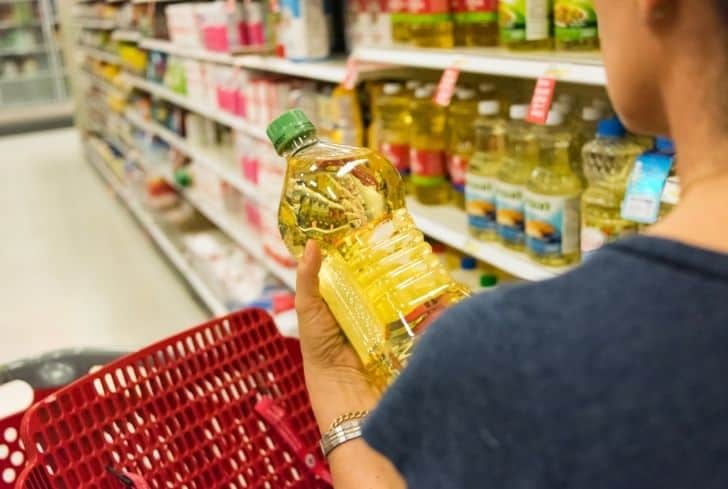An essential cooking material is cooking oil. In fact, there’s hardly a meal you can prepare without including this healthy lubricant. Grease, on the other hand, is a fatty substance we get from foods like bacon, meat, etc. The importance of these lubricants cannot be overemphasized.
While we enjoy using these two lubricants to cook, bake and particularly fry different foods, we inevitably have some leftovers. We also experience some spillage occasionally.
Now, this begs the question of whether we can dump these leftovers and spillages into our compost piles or down the drain. As we know, certain materials should never go near the compost piles for apparent reasons.
In this blog post, we’ll briefly let you know whether you can compost cooking oil and grease and delve into how to dispose of these lubricants properly. Please, enjoy!
Is Cooking Oil and Grease Compostable?
While we know that compostable materials are items that microbes can break down within the shortest possible period, not all these items should go into the compost pile. Some of them could be harmful to the soil or invite animals to have a feast!
For instance, although leftover meat, fish, bones and even milk will be great for improving the nutrients in the plant, you should never mistake including them in your compost pile. Pests can smell these delicious aromas from miles away and may take it as a gracious invitation to come and feast.
Now, this is precisely applicable to cooking oil, mainly leftover oil from a meal. It has that delicious aroma that is so enticing to animals, and if you include it in your compost pile, you may wake up to a disaster in your garden. The pests that catch a whiff of that scent can come over to inspect it and subsequently dig up all the materials that have been buried for weeks.
For sure, you can bury them back, but would you like to go through that stress? Additionally, you may have opened the eyes of the pests in your area to the delicious delicacies in your garden, making them always come back for more. As such, it’s best to avoid composting cooking oil and grease.
You should also know that cooking oil and grease aren’t accepted in community compost bins. This is because these lubricants may be too strong to be broken down. After all, they will not get enough sunlight in the compost bins.
Can You Compost Bacon Grease?
If you’re trying to eat healthily, you’ll know that it’s best to avoid consuming bacon grease in a large quantity. In fact, it’ll be in your best interest to avoid it entirely. However, when you cook bacon for breakfast or a quick snack, it’s almost inevitable that you’ll be left with some grease.
You may then be wondering if you can compost bacon grease. Well, it’s a bad idea for two reasons. For one, bacon grease can attract rodents to come and feast on the materials in your compost pile. Second, it has a potent smell, the smell of bacon, of course, and this is a meal every rodent within the area will want to taste.
This can cause them to dig up the compost pile and even destroy the other materials in there. If they haven’t been plaguing your plants previously, they may see this as the perfect avenue to do so. You may go to bed with a perfectly tidy garden and wake up to chaos, so avoid dumping bacon grease in your compost pile.
The other reason is that the sunlight in your area may not be sufficient to break down the bacon grease in your compost pile adequately. The other alternative will be for microbes to feast on and break it down, but again, there are some types of grease that microbes don’t enjoy and will not break down. So, the only other solution will be to leave it to time and extreme weather conditions for decomposition.
Most community compost bins frown on including bacon grease in the materials you put in them. This is because the bacon grease will likely end up at a position in the compost pile that’ll be largely inaccessible by the scorching sun, making it really hard for decomposition to take place. So, it’ll just end up in that pile for a very long time, which frankly defeats the purpose of composting.
Can You Pour Grease Down the Drain?
We’ve already established that it’s almost impossible not to have leftover grease from cooking or even spillages. Since grease is in a liquid form most of the time, our immediate thought may be to pour it down the drain; after all, this place is pretty suitable for water and other liquid waste.
Well, you certainly shouldn’t pour it down the drain. While it’s in liquid form when it’s hot, grease solidifies quite easily, which means it may safely go down your drain before this process begins, but it won’t remain liquid forever. In fact, within a few minutes, it will start to solidify and may eventually clog your pipes.
Regularly pouring grease down the drain will eventually clog your pipes and could ultimately destroy the sewer system. So, how do you dispose of grease? Well, here’s how.
It’s recommended that you get a non-recyclable container to store all your grease. You can subsequently place these containers in the fridge and keep adding to them until their filled up. Then, you can throw this container in the regular trash can.
Is Cooking Oil Bad For the Soil?
There’s a limited number of times you can reuse oil you’ve used to fry or bake. Once you reach your limit, you’ll undoubtedly look for ways to dispose of it. If you have a garden, you may consider feeding the cooking oil to your soil; after all, cooking oil seems like it would be great for the soil.
Well, you’re not entirely wrong. In fact, cooking oil in small quantities is excellent for the soil. It helps it retain moisture, thereby keeping your plants going in parts of your garden that don’t have sufficient water supply. It can also help revitalize your plants’ vigor.
However, not all cooking oils have these effects, and the quantity you feed the soil also matters. Excessive cooking oil is detrimental and will undoubtedly invite pests to come and destroy your garden.
Regarding the type of oil, natural oils like sunflower oil, vegetable oil, soybean oil, etc., are suitable for the soil and will easily be broken down by microbes. However, if you’ve used any of these oils to cook or fry meat, they’ll have a component of animal fat in them, and microbes find it difficult or nearly impossible to break these down.
As such, it’s best to simply store them in a non-recyclable container and dispose of them in the refuse bin.
What to do With Old Cooking Oil?
Since you can’t regularly feed your soil with cooking oil or even add it to your garden’s or community’s compost pile, you’ll be looking for proper ways to dispose of it. Well, it can’t go down the drain either, so what can you do about it?
In this section, we’ll show you creative and exciting ways to dispose of cooking oil. So please, dive right in!
1. Make Candles
Scented candles are excellent items to own. In fact, if you enjoy the occasional hot bath or cozy atmosphere, you’ll be a huge fan of scented candles. Well, one of the ways you can reuse your old cooking oil will be to turn it into a candle.
For this hack, you’ll need a glass jar, two match sticks, a swab of cotton wool, cooking oil, a candle wick, and some salt. Ensure the cooking oil is in a liquid form and pour it into a jar with some salt.
Then wrap the match stick properly with the cotton wool and place it into the jar. The salt will make sure the stick stays in place, and just like that, you have a candle. Of course, you can also add your favorite scent to this mixture.
2. Survival Lamps
These lamps are great for camping or can even be used in the home to create a cozy ambiance. They’re like candles but don’t release any scent and won’t burn out as fast.
For this craft, you’ll need a mason jar, some cooking oil, and a wick. You can also use other containers, but ensure that the width is greater than the depth of that container.
Make a hole in the mason jar’s cover, and get an item that’ll hold the wick in place.
Pour your cooking oil into the jar, place the wick in it and pass it through the perforated hole in the cover and voila, you have yourself an oil lamp! The best part is that survival lamps are hard to put out by strong winds, which means you’ll have a steady source of light on your camping trips.
3. Handmade Soaps
Your leftover cooking oil will also make great handmade soap. This hack requires some leftover cooking oil, NaOH, some water and scented oils.
Please ensure your cooking oil is very clean, and you can remove every imperfection by bleaching and straining it several times. You should also wear gloves because you’ll be working with NaOH, a chemical component that won’t hurt you when it’s in soap but may not be as touch-friendly when bare.
Get a container for water, another for oil, and the last one for the NaOH or caustic soda. Put small scoops of caustic soda into the water and stir thoroughly but gently. A chemical reaction will occur with each scoop of NaOH you add to the water, causing its temperature to rise slowly.
Then, let the mixture cool for a while; it has to have the same temperature as the leftover cooking oil, so it won’t be difficult for the two substances to mix properly into each other. Next, stir these two components thoroughly, and add to your essential oil. Once it cools, you’ll have a couple of handmade soaps you can carve into shapes and sizes you desire.
Conclusion
Cooking oil provides us with a solid source of fats and oils, and we cannot do without if we intend to have a balanced diet. On the other hand, Grease is a product of some of the meals we consume, like bacon and fat from other animals.
Sadly, these liquid food wastes cannot go down the drain without leaving negative impacts on our pipes. We also can’t compost them without inviting rodents to have a feast.
As such, we have provided adequate methods to dispose of cooking oil and grease properly. So please, digest this blog post and make more informed decisions.
References:
https://www.myrecipes.com/extracrispy/how-to-get-rid-of-bacon-grease
http://www.askaprepper.com/make-survival-lamp-used-cooking-oil/






